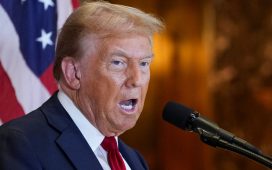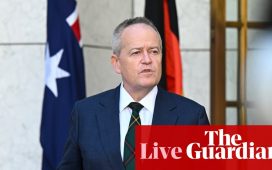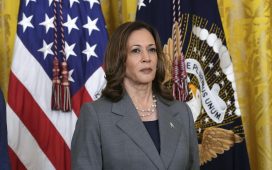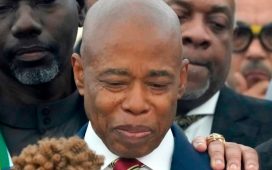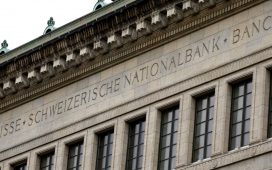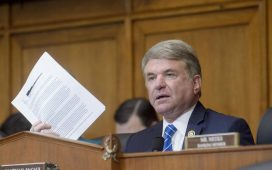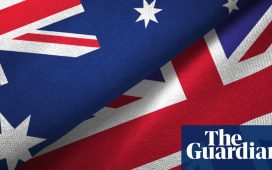Hezbollah confirms death of leader Hassan Nasrallah
William Christou reports from Beirut…
Hezbollah has issued a statement confirming the death of its secretary general, Hassan Nasrallah, who was killed in an Israeli airstrike on the southern suburbs of Beirut on Friday, ending his 32-year tenure as the group’s leader.
The group said in a statement:
His eminence, the master of resistance, the righteous servant, has passed away to be with his lord who is pleased with him as a great martyr.
The leadership of Hezbollah pledges … to continue its jihad in confronting the enemy [Israel], supporting Gaza and Palestine, and defending Lebanon and its steadfast and honourable people.
The statement did not mention who would succeed Nasrallah, or how the group would respond to the assassination of its long-time leader.
Hezbollah added it would continue its battle against Israel “in support of Gaza and Palestine, and in defence of Lebanon and its steadfast and honourable people”.
After Hezbollah confirmed Nasrallah’s death, Iranian media reported that General Abbas Nilforoushan, a deputy commander of Iran’s Revolutionary Guards, had died “next to Nasrallah” in the Israeli strikes on south Beirut on Friday. This claim has not been independently verified by the Guardian.
Key events
Profile: Hezbollah’s leader inspired adulation and bitter enmity
The killing of Hassan Nasrallah, the veteran leader of Hezbollah, on Friday marks a turning point in the conflict in the Middle East. Both Nasrallah and the organisation he led were hardened by successive decades of conflict within Lebanon, against Israel and, latterly, in Syria. Both were powerful political and social forces with very significant regional and local influence.
Through more than three decades in charge of Hezbollah, Nasrallah built up a fervent personal following, steering the Shia Muslim movement through a number of transitions, balancing the demands of its military role with those of its expansive social welfare systems, building a political wing and negotiating the various crises that broke across the region. He earned adulation from supporters and bitter personal enmity from foes.
Nasrallah was born in about 1960, the son of a Shia vegetable seller in a poor, mixed neighbourhood of Beirut. Despite their growing numbers, Lebanon’s Shia people had long been marginalised politically and economically. Nasrallah was inspired by the new Islamist ideologies spreading across the Middle East and by a moderate Iranian-born cleric, Musa al-Sadr, who sought to mobilise Lebanon’s Shia to win greater representation and more resources. He joined Amal, a Shia militia formed shortly before the brutal civil war that broke out in Lebanon in 1975.
You can read the full profile of Nasrallah in this piece by my colleague, Jason Burke, which considers what the next steps may be following the Hezbollah leader’s assassination by Israel:
A spokesperson for Iran Air has announced the cancellation of all flights to Rafic Hariri airport in Beirut until further notice, Al Jazeera reports.
It comes after the EU warned airlines to avoid Lebanese and Israeli airspace for the next month.
In a post on X, Iranian foreign ministry spokesperson Nasser Kanaani vowed that Hassan Nasrallah’s “path will be continued and his holy goal will be realised in the liberation of Jerusalem”.
Journalists from Agence France-Presse (AFP) have spoken to Israelis about their views on the killing of Hassan Nasrallah.
“Absolutely fantastic news, it should have been done a long time ago,” David Shalev, a resident of Israel’s commercial hub, said.
In the coastal city of Rishon LeZion in central Israel, Shuli Diaz called Friday’s deadly strike on Nasrallah “an amazing move”.
“I think that the elimination of Nasrallah will bring an end to the war,” Diaz said. “I believe that this will bring some sort of political resolution. I at least hope so.”
Turkish president says Israel is committing genocide in Lebanon
The Turkish president, Recep Tayyip Erdoğan, has said Lebanese people are the new target of “Israel’s policy of genocide, occupation and invasion” that started last year when it began its war in Gaza after the 7 October Hamas attacks on southern Israel.
The Turkish leader, who has been highly critical of Israel’s ongoing assault on Gaza, said children were among Lebanese civilians who have been “murdered” by “brutal” Israeli strikes conducted on Lebanon this week.
“No one with a conscience can accept, excuse or justify such a massacre,” he wrote in a post on X.
“The Israeli government is becoming more and more reckless as it is pampered by the powers that provide arms and ammunition for its massacres; it is defying all humanity, human values and international law.”
Erdoğan said it was up to global structures, particularly the UN security council, to take swift action to stop Israel’s “inhumane attacks against Lebanon”. He has previously accused Israel of genocide for its war on Gaza, called for it to be punished in international courts and criticised western nations for backing the country’s military assault.
İsrail’in, 7 Ekim’den bu yana sürdürdüğü soykırım, işgal ve istila politikasının yeni hedefinde Lübnan ve Lübnan halkı vardır.
İsrail’in vahşi saldırıları sonucunda son bir hafta içerisinde aralarında çocukların da olduğu çok sayıda Lübnanlı katledilmiştir.
Vicdan sahibi hiç…
— Recep Tayyip Erdoğan (@RTErdogan) September 28, 2024
The Houthi movement in Yemen has mourned the killing of Hezbollah leader Hassan Nasrallah, its ally in an Iran-backed alliance opposing Israel.
“The resistance will not be broken, and the Jihadist spirit of the Mujahideen brothers in Lebanon and on all fronts of support will grow stronger and bigger,” the group said in a statement.
Hamas, the Palestinian militant group, issued a similar statement earlier, mourning the death of Nasrallah (see post at 13.09).
Over the past year the Iran-aligned Houthis have launched repeated drone and missile strikes on ships in the crucial Red Sea shipping channels, saying they are doing it in a show of solidarity for Palestinians in Israel’s war on Gaza.
The group, which controls northern Yemen, also fired missiles and drones at Israel repeatedly, some of which targeted central Israel for the first time
Who is Hashem Safieddine, Hezbollah’s second in command?
Hezbollah’s second in command, Hashem Safieddine, could succeed Hassan Nasrallah as leader of the Lebanese militant group. Reuters has been told by a source that Safieddine survived Friday’s Israeli attacks on Beirut that killed Nasrallah. Here are some facts about Safieddine:
-
As head of the executive council, Safieddine oversees Hezbollah’s political affairs.
-
Safieddine sits on the Jihad council, which manages the group’s military operations.
-
Safieddine is a cousin of Nasrallah and like him is a cleric.
-
The US state department designated Safieddine a terrorist in 2017 and in June he threatened a major escalation against Israel after the killing of another Hezbollah commander.
-
Safieddine’s public statements often reflect Hezbollah’s alignment with the Palestinian cause.
Israel’s war is not with the Lebanese people, defence minister says
Israel’s war is not with the Lebanese people, the country’s defence minister, Yoav Gallant, has said after the Israeli military confirmed the killing of Hasan Nasrallah, Hezbollah’s leader, in airstrikes on Beirut on Friday.
In a statement, Gallant said:
He (Nasrallah) was the murderer of thousands of Israelis and foreign citizens. He was an immediate threat to the lives of thousands of Israelis and other citizens.
To the people of Lebanon, I say: Our war is not with you. It’s time for change.
There have been reports that Benjamin Netanyahu, the Israeli prime minister, is contemplating firing Gallant, and replacing him with Gideon Saar, a member of the opposition and the New Hope party leader.
The Israel Defense Forces (IDF) spokesperson Daniel Hagari has given a televised address. Here is some of what he said:
-
Hagari described Hassan Nasrallah, the Hezbollah leader killed in Israeli airstrikes in Beirut on Friday, as being “among the biggest-ever enemies of Israel”.
-
Hagari said Israel’s army is currently attacking Hezbollah infrastructure in Lebanon.
-
“It’s not over, Hezbollah has more capabilities,” Hagari said, adding that the Israeli military remains at “peak alert around the clock”.
-
Gatherings in the centre of Israel have been capped at 1,000 people.
Over 50,000 people living in Lebanon have crossed into Syria to flee Israeli airstrikes, UN says
The UN high commissioner for refugees, Filippo Grandi, said more than 50,000 Lebanese and Syrian people living in Lebanon have now crossed into Syria fleeing Israeli airstrikes. “Well over 200,000 are displaced inside Lebanon,” he added in a post on X.
More than 50,000 Lebanese and Syrians living in Lebanon have now crossed into Syria fleeing Israeli airstrikes. Well over 200,000 are displaced inside Lebanon.
Relief operations are underway, including by UNHCR, to help all those in need, in coordination with both governments. pic.twitter.com/Qcvdw79z8A
— Filippo Grandi (@FilippoGrandi) September 28, 2024
The UN refugee agency has been working with Syria’s government and partners to fasten the processing of those who arrive. Officials have said Syria was allowing Lebanese nationals to enter for an unspecified time as long as they had some kind of papers showing their name.
Unicef Lebanon has also issued a statement denouncing the Israeli strikes on the country.
A post on X read:
Massive attacks on Lebanon are pushing the situation toward catastrophe. Tens of thousands of families have been displaced overnight, with nowhere to go. Children are bearing the brunt – lives lost and many at risk. This violence must stop now.
Massive attacks on #Lebanon are pushing the situation toward catastrophe. Tens of thousands of families have been displaced overnight, with nowhere to go. Children are bearing the brunt—lives lost and many at risk.
This violence must stop now. pic.twitter.com/FF470wUnt9
— UNICEF Lebanon (@UNICEFLebanon) September 28, 2024
The head of the UN agency for Palestinian refugees (Unrwa), Philippe Lazzarini, said Israeli airstrikes in Lebanon have displaced thousands of people from their homes, including Palestinian refugees who had fled Gaza due to Israeli bombardments there.
In a post on X, Unrwa’s commissioner general, said seven shelters have been opened for displaced people fleeing Israeli strikes. Many of these people are traumatised, he said, having lived through “repeated cycles of conflict” across the Middle East over recent decades.
“A further expansion of the war will only bring more suffering for civilians. Civilians must be protected. Civilian infrastructure must not be targeted,” he said.
Israeli Forces airstrikes in #Lebanon have forced thousands of people to flee their homes among them Palestine Refugees.@UNRWA teams are responding.
We have opened seven shelters for the displaced, currently hosting 1,600 including Lebanese, Palestinian & Syrian.Many are… pic.twitter.com/cXXWL4Zk5W
— Philippe Lazzarini (@UNLazzarini) September 28, 2024
Unrwa, which provides healthcare, education and humanitarian aid to Palestinians, is widely viewed as the backbone of aid operations in Gaza.
The Hezbollah headquarters in Beirut where the group’s leader Hassan Nasrallah was killed in an Israeli strike was a legitimate military target under international law, an Israeli military spokesperson has said.
Rear Admiral Daniel Hagari also said that Israel had issued stricter guidelines to civilians by limiting the size of gatherings in areas of central Israel to 1,000 people.
Palestinian group Hamas has said in a statement it mourns the death of Hezbollah leader Hassan Nasrallah.
It said:
Crimes and assassination by the occupation will only increase the determination and the insistence of the resistance in Palestine and Lebanon to go forward with all their might, bravery and pride on the footsteps of the martyrs…and pursue the path of resistance until victory and the dismissal of the occupation.
We reaffirm our absolute solidarity and standing with the brothers in Hezbollah and the Islamic Resistance in Lebanon, who are taking part in the battle of the Al-Aqsa Flood to defend Al-Aqsa mosque, alongside our people and our resistance.
Asked how Nasrallah’s death would affect the fight against Israel, senior Hamas official Sami Abu Zuhri told Reuters:
The assassination of Hassan Nasrallah will not break the will of the resistance and we are confident that the occupation will lose the battle.
William Christou reports from Beirut…
Gunfire has been heard across Beirut as mourners fire in the air to commemorate the death of Nasrallah.
Hezbollah confirms death of leader Hassan Nasrallah
William Christou reports from Beirut…
Hezbollah has issued a statement confirming the death of its secretary general, Hassan Nasrallah, who was killed in an Israeli airstrike on the southern suburbs of Beirut on Friday, ending his 32-year tenure as the group’s leader.
The group said in a statement:
His eminence, the master of resistance, the righteous servant, has passed away to be with his lord who is pleased with him as a great martyr.
The leadership of Hezbollah pledges … to continue its jihad in confronting the enemy [Israel], supporting Gaza and Palestine, and defending Lebanon and its steadfast and honourable people.
The statement did not mention who would succeed Nasrallah, or how the group would respond to the assassination of its long-time leader.
Hezbollah added it would continue its battle against Israel “in support of Gaza and Palestine, and in defence of Lebanon and its steadfast and honourable people”.
After Hezbollah confirmed Nasrallah’s death, Iranian media reported that General Abbas Nilforoushan, a deputy commander of Iran’s Revolutionary Guards, had died “next to Nasrallah” in the Israeli strikes on south Beirut on Friday. This claim has not been independently verified by the Guardian.
Lebanon’s cabinet to convene emergency session this evening
William Christou
The Lebanese army deployed throughout Beirut on Saturday afternoon, standing guard at major intersections throughout the city, likely in anticipation of popular reactions to the apparent killing of Hezbollah secretary general Hassan Nasrallah.
Lines formed at Beirut supermarkets as people rushed to buy basic goods such as water and dried foods, while people waited in queues outside ATMs. The buzz of low-flying Israeli drones patrolling Beirut’s skies was a constant sound throughout the day.
Lebanon’s cabinet announced it would convene for an extraordinary session at 19:30 pm (BST 17:30) in response to the events of the last two days.
William Christou
William Christou has been reporting for the Guardian from Beirut
A source in a Lebanese parliamentary party opposed to Hezbollah said that while it was too early to comment on Nasrallah’s death and the effect it will have on the country, they said this moment could be seized upon to “turn a page” in Lebanon and “regroup under the rule of the state and constitution”.
“Hezbollah’s rhetoric for the last two decades has been calling for a parallel state, communication, economy and everything. Apparently, this rhetoric has proven not to be successful at all,” the source said, adding that the country needed to “grasp the momentum today, build a state” and elect a president.
Lebanon has been without a president for almost two years, as Hezbollah and opposition blocks wrestled over a preferred candidate.
“This war has been highly costly, we need to turn things around,” the source said.

Peter Beaumont
Peter Beaumont is a senior international reporter for the Guardian
Israel’s claimed assassination of Hezbollah’s leader, Sayyed Hassan Nasrallah, in a massive strike on an underground headquarters in Beirut’s southern suburbs marks the most alarming escalation in almost a year of war between the Shia militant organisation and Israel.
Immediately after a bellicose speech by the Israeli prime minister, Benjamin Netanyahu, at the UN general assembly – where he appeared to directly threaten Iran as well as promise to continue “degrading” Hezbollah – the first reports of a major strike began to emerge.
In less than an hour, Israeli journalists with connections to the country’s defence and security establishment were suggesting Nasrallah was the target and that he had been in the area of the headquarters at the time of the strike. On Saturday morning, the Israeli military said he had been killed.
That the strike was regarded as highly significant was quickly confirmed soon after it happened by a series of statements from Israel – including an image showing Netanyahu ordering the attack on the phone from his New York hotel room.
You can read the full story here:

